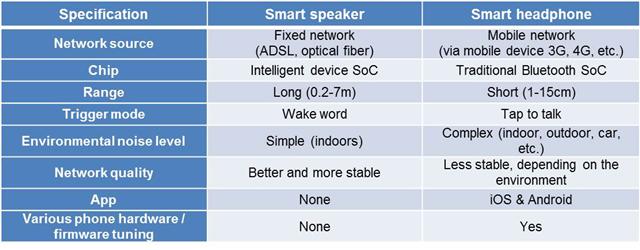The highly competitive intelligent voice service market has seen tech giants keenly rolling out solutions and devices, such as Amazon Alexa, Google Assistant, and Apple's Siri. UnlimiterHear, which specializes in hearing aid algorithm, is also catching up with the trend by launching a series of intelligent voice service solutions with which a simple press on a button on a Bluetooth headset can activate various intelligent voice services on the cloud, turning a set of traditional headphones into an intelligent voice assistant.
In 2016, about 20% of mobile device searches were done with voice input at a 95% accuracy. Market research firm IHS Markit predicts that by the end of 2017, more than 4 billion consumer devices will support voice assistant functionality. Dr. Yang Kuo-Ping, chairman for UnlimiterHear, believes that in the IoT era, the exchange of conversational voices is indispensable for large-scale cooperation between people and devices.
This year, UnlimiterHear has been focusing on the research and development on listening and hearing device solutions, and one of the solutions allows users to directly press a button on a Bluetooth device to activate voice assistant services offered by major brand vendors. Currently it supports services offered by Amazon, Google and Apple and in the future will also support Baidu, iFLYTEK and others with third-party developers expected to build thousands of life and interaction skills. Dr. Yang further notes that each voice assistant solution has its own focus on specific areas: Google's strengths is in search engine; Microsoft's is good at scheduling; and Amazon's can link to shopping and other life applications, which is believed to be the most promising services compared to others.
Amazon recently unveiled a range of smart home devices, with Alexa responsible for voice activation. Such a voice assistant fad is expected to benefit Taiwan's supply chain. UnlimiterHear owns more than 100 audio patents including several patents for smart voice-enabled Bluetooth headphones. The company is actively working with international semiconductor chip vendors and in fact eight of them are incorporating UnlimiterHear's technology into their new products. Bluetooth headphones have been around for nearly 20 years, mainly for listening to music and answering the phone. With the rise of the intelligent voice services, now Bluetooth headphones can interact with apps and cloud platforms, and will soon become major functions for next-generation smart Bluetooth headphones.
UnlimiterHear CEO Tony Huang notes that Taiwan's manufactures has been focusing mainly on hardware, namely smart speakers, while UnlimiterHear last year decided to focus on actively developing and importing intelligent voice assistant applications into smart Bluetooth headphones, smart Bluetooth speakers and other portable Bluetooth devices. For example, UnlimiterHear's internally-developed EarCommand "tap to talk" intelligent voice assistant is featured in smart speakers and smart headphones. The two kinds of device technically have several differences. Smart speakers use Wi-Fi and far-field voice recognition; they don't need app support; and they work on a closed platform. Smart headphones are Bluetooth-connected and can be activated by tapping; they need app support and require tuning for different mobile phone hardware or firmware; they work on near-field voice recognition and an open platform.
UnlimiterHear's "tap to talk" intelligent voice assistant solution requires just a press on the button to activate the voice assistant service, without the need to articulate a wake word. Dr. Yang points out that the wake-word mode consumes more power because it must constantly monitor the external environment, and is prone to making identification errors. The tap-to-talk mode doesn't have the problems typical of the wake-word mode. The current market trend also prefers tap-to-talk to the other. This is because users can quickly select and switch the mainstream voice assistants, and can call voice assistants even when the screen is off. Also, users do not need to remove the phone from the pocket or bag and still can call voice assistants, making it more convenient.
UnlimiterHear has also developed a proprietary acoustic algorithm simulation system for Bluetooth headsets to support different situations of audio input, simulation of thousands of different sound environment conditions, and the establishment of sound models that speed up the voice response time. The company's internal tests compared iOS Alexa app and its own algorithm, and the results showed that UnlimiterHear's algorithm is 25% faster in response time.
In the future, UnlimiterHear will focus on putting hearing algorithm and MFA (Millisecond Frequency Adjustment) into EarCommand. For example, calls to Alexa Smart Voice Assistant on the cloud will shift the high frequency sound, so that people with hearing impairments can hear more clearly. In addition, the artificial intelligence acoustics simulation system will be enhanced to improve the performance of devices associated with Alexa, allowing people to hear low tunes and whispers.

Comparison of the smart speaker and smart headphone technology
DIGITIMES' editorial team was not involved in the creation or production of this content. Companies looking to contribute commercial news or press releases are welcome to contact us.